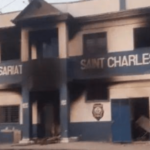The linguistic conflict in Haiti finds its echo in the music of Nemours Jean-Baptiste
“Compas direct” or “Konpa dirèk”? The question of how to write the music popularized by Nemours Jean-Baptiste is fascinating.
Music analyst Philippe Saint-Louis disapproves of “Konpa dirèk.”
“Nemours recorded his orchestra with French spelling,” Saint-Louis maintains.
“The French spelling as written by Nemours is a historical fact that can be proven,” continues the owner of the Alternative Plus platform.
The vast majority of compas songs are in Creole.
But the spelling of this music created in the 1950s – a period when Creole was less valued and structured than today – continues to be debated.
Nemours Jean-Baptiste had used French spelling on all his albums.
The French spelling as written by Nemours is a historical fact that can be proven.
– Philippe Saint-Louis
Groups that followed in his footsteps in the 1960s and 1970s also used the spelling “Compas direct” and not “Konpa dirèk”.
However, from the 1980s onwards, the spelling “Konpa dirèk” became very popular.
Moreover, this music was officially submitted by the permanent delegation of Haiti to UNESCO in March 2024, to be included on the representative list of the intangible heritage of humanity under both spellings: Konpa/Compas.
Read also: Konpa No Longer Belongs to Haitians | Perspective
The fact that the use of the country’s official languages to write the compass is still a matter of debate indicates that there is still a long way to go to make Creole accepted as a language in its own right in a country still dominated by diglossia to the detriment of the language spoken by the majority.
Nemours Jean-Baptiste did not write “konpa” because of the linguistic context of the 1950s, analyzes Jhonny Célicourt, music critic and author of DictionnArt.
In the 1950s, Creole was in a position of official inferiority to the French language. It had neither a formal orthography nor a legal status.
This language was marginalized, even banned in certain areas, notably the media and education.
Nemours Jean-Baptiste did not write “konpa” because of the linguistic context of the 1950s.
– Jhonny Célicourt
The Haitian Independence Act of 1804 was written in French.
According to all Haitian Constitutions from 1918 until that of 1987, French was the language of administration, education and the press.
Creole began to gain ground in education following the reform of Minister Joseph C. Bernard in the educational system between 1979 and 1980.
Other dates remain important for understanding the rise of Creole.
For example, the language obtained an official spelling in 1979; gained recognition as a national language in the 1983 Constitution under the Duvalier regime; and official status in the 1987 Constitution.
Its use in advertisements and awareness campaigns has intensified after its officialization.
The first president of the so-called democratic era, Jean Bertrand Aristide, used Creole in his inauguration speech in 1991.
In his article “Haiti, French as a heritage,” Jean-Marie Théodat discussed the evolution of Haitians’ relationship with the French language.
According to the author, Creole enjoys a certain hegemony in the media and culture and English is gaining strength.
These social factors contribute to the decline of French both in Haitian society and in the Konpa sector.
Creole began to gain ground in education following the reform of Minister Joseph C. Bernard in the educational system between 1979 and 1980.
Gradually, French, the language of intellectual and political elites, is losing social prestige.
Today, no tenor group of this generation on the Konpa scene has a name in French.
In some cases they are compound names, in others they are Creole or English names.
Among these groups, we can mention Klass, Nu-Look, Harmonic, T-Vice, Zenglen, Kreyòl La, Impossible, Kaï, Vayb, Gabel, Mass Konpa, Disciple and Team.
However, in the 1960s and 1970s, when Creole was in a minority situation in favor of French, many groups had French names.
In addition to groups from Nemours such as Ensemble aux Calebasses and Ensemble Nemours Jean-Baptiste, the majority of other groups used the French language.
These include The Black Wolves, The Dejean Brothers, The Ambassadors, The Difficult Ones of Pétion-Ville, The Fantaisistes of Carrefour and The Invincibles of Jacmel.
Today, no tenor group of this generation on the Konpa scene has a name in French.
Between the flagship and the less popular groups, I have listed around thirty Konpa groups with French names in the 1960s and 1970s.
Today, apart from Arly Larivière and his musical group Nu-Look, which makes considerable use of French, one can count on the fingers of one hand the albums and songs with French titles.
This was not the case before when French held all its social prestige in the country.
This language had some presence in Konpa through band names, song and album titles as well as song lyrics.
In my own articles and research on Nemours’ music in earlier years, I used only the French spelling “Compas direct.”
For several years now, in order to highlight my Creole identity on the one hand, and to remind my readers that this music is rooted in Haitian culture on the other hand, I have decided to no longer use French spelling.
Read also: Zenglen’s “Kreyòl Nou Ye”, an important song that has been little studied
Former conservatives are softening on these issues.
“I had the honor of working with Nemours Jean-Baptiste and he used the French spelling ”Compas Direct”,” insisted Jean Jean-Pierre, former drummer of Bossa Combo and Immortel Shleu Shleu, in a message he sent me in April 2024 after the publication of my article titled “Konpa no longer belongs to Haitians».
But Jean-Pierre willingly accepts the use of Creole to emphasize Haiti, the country of origin of the music.
Cover image edited by AyiboPost, featuring Haitian saxophonist Nemours Jean-Baptiste.
Stay in touch with AyiboPost via:
► Our channel Telegram : Click here
► Our Channel WhatsApp : Click here
► Our Community WhatsApp : Click here







